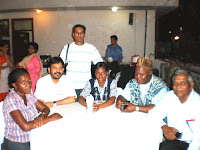

Rationale of Gender & Breastfeeding
By James Achanyi-Fontem, Cameroon Link
Introducing the issue of gender during the training in Delhi, India last July 2009, Renu khanna, talked about the rationale observing that it is increasingly being recognised that a gender perspective on social issues helps refine action strategies to bring about desired results for social change and equity.
The platform for action resulting from the 4th World Conference on Women in Beijing(1995) and the programme of action of the International Conference for Population and Development (Cairo 1994) legitimised the concerns of women’s movements world over that a woman’s perspective as well as gender perspective is essential in social sector policies and programmes.
Renu Khanna said, a gender approach takes full account of gender differences and responds appropriately to them in the development, implementation, monitoring and evaluation of services in any sector. As such, the training was designed to help breastfeeding advocates to build strategies on gender and breastfeeding in their respective constituencies.
To better understand issues, it was revealed that gender is not sex and vice versa. Sex refers to the biological differences between men and women, while gender refers to roles (behavioural norms) that men and women play and the relations that arise out of these roles. These roles, it should be noted, are socially constructed, not physically determined.
Gender characteristics are relational, change over time, are institutional, vary with ethnicity, class, culture and so on. Gender sensitisation calls for male responsibilities and participation. It aims at promoting gender equality in all spheres of life, including family and community life, and to encourage and enable men to take responsibility for their sexual and reproductive behaviour and their social and family roles.
The importance of male involvement was further reaffirmed in the platform for action adopted at the UN World Conference on Women in Beijing 1995, because gender issues are not the concern of women alone. Helping men understand hoe gender equality benefits them can help them become key allies in creating a more gender-equitable world.
This means that the achievement of gender equality will not be possible without the active involvement and support of men. Gender sensitisation for men is necessary so that interventions for women and girls are not derailed by male resistance.
It is important to make it clear in this contribution that promoting gender equality is not about granting privileges to women while disempowering men. It is all about creating integrated approaches that benefit all. It is about creating a gender equitable and just world.
The gender gap in many countries are so wide that a vast majority of women are poor, illiterate and suffer ill health and poor nutrition, with inadequate education and poor job opportunities. Their low social and economic status hampers their political participation and decision-making.
Very often, the current patterns of domination and inequality are so deeply embedded in cultures and institutions that we do not recognise them and thereby even accept them as the norm. Good examples are violence against women, giving boys more food than girls in a family, unequal pay for women, child care and housework being women’s responsibilities. Women will be empowered only when they enjoy equal treatment and have access to education, economic resources and enjoy good health.
The enhance men’s awareness, Paul Sinnapen emphasised that men have to be sensitised about the existing gender gaps and help them understand gender roles and their impact on social and economic disparity among women. Change in patriarchal mind set and attitudes of men are crucial in bringing about gender justice.
Addressing participants in Delhi, India as breastfeeding advocates, Sarah Amin, Co-Director of WABA, outlined that for a long time breastfeeding promotion has focused on the child, often to the absence of the mother, the woman. She added that breastfeeding is a symbiotic relationship between the mother and the child, and thus any analysis and response or interventions should take into account both persons involved in the act.
According to Sarah Amin, gender inequalities, including the inequalities in health status and access to and use of health services, not only make women’s lives more difficult, they also often make breastfeeding and other tasks, such as child care and nurturing very challenging. Breastfeeding advocates can better support women to breastfed when they understand the causes of gender inequality and know how to analyse and address such unequal conditions.

No comments:
Post a Comment